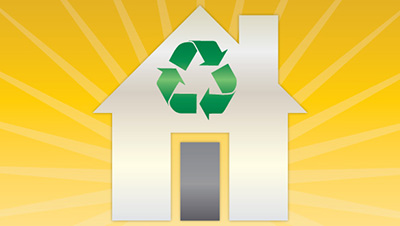Finding ways to be more energy efficient and eco-positive isn’t just good for the environment — it can be good for your home, your family and your bottom line. Here are hints on how:

- Reduce, reuse, recycle: Look around—a simple mental checklist of reusable, recyclable items which you can donate can make a big difference. For example, take old books and donate them to a school or library. If you buy eggs in cartons, ask your local elementary school or after-school center if they can be used for art projects. If you’re renovating your home or planning home improvement projects, remember just about everything, from old flooring to doorknobs and light fixtures, can be re-purposed by a charity if not by you.
- Eat and drink your way to a healthier family and planet: How (and what) you eat can make a big impact on your health, the environment and the community. Farmers’ markets are often bursting with fresh produce. Supporting one helps preserve the vitality of community agriculture. Buying local means produce is fresher—it hasn’t been shipped from hundreds of miles away. Avoid buying fruits and vegetables on the Environmental Working Group's Shopper's Guide to Pesticides "Dirty Dozen" list of fruits and vegetables having the most pesticide residues, and choose instead, EWG's "Clean Fifteen". Using your refrigerator’s water dispense system and a reusable bottle instead of bottled water can keep up to 300 plastic bottles a year from ending up in landfills.
- Let appliances do the saving for you: New home appliances are often far more efficient than older models. New washers may use 75 percent less water and 82 percent less energy than those manufactured just a decade ago, and could save you money on your utility bills.










